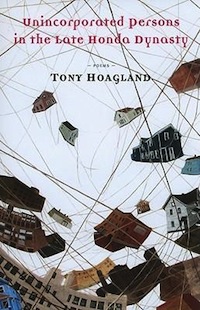Having Fun With Words

North Carolina-born poet Tony Hoagland (What Narcissism Means to Me), who is well-regarded and lauded in the poetry world (which is hardly ever confused as the real world), might have titled his new long-awaited collection (Unincorporated Persons in the Late Honda Dynasty, Graywolf Press) something along the lines of Poets Having Fun with Words.
When he was awarded the prestigious Jackson Poetry Prize, the award citation observed:
It’s hard to imagine any aspect of contemporary American life that couldn’t make its way into the writing of Tony Hoagland or a word in common or formal usage he would shy away from. He is a poet of risk: he risks wild laughter in poems that are totally heartfelt, poems you want to read out loud to anyone who needs to know the score and even more so to those who think they know the score. The framework of his writing is immense, almost as large as the tarnished nation he wandered into under the star of poetry
Hoagland is, on the one hand, attuned to the humorous and ridiculous encountered in everyday life and, on the other hand, acutely attuned to the manifold ways and oblique angles trouble comes at all of us. To quote David Brouwer’s recent appraisal of Hoagland’s new work:
Predictable adjectives, dull verbs, zero tension in the line breaks, no discernible effort at musicality. If you’re sufficiently attuned to Hoagland’s sensibility, you’ll see his forceful rejection of poetry’s tricks of the trade as indicative of his determination to tell the truth and tell it straight, and you’ll thank him for it. If you’re not, you’ll just be bored. A plain-spoken poetry like Hoagland’s can create a terrific, even conspiratorial sense of intimacy with those readers who are sympathetic to it, but offers few pleasures to those who aren’t.
In “Personal,” Hoagland writes:
Get over it
Clearly not a poet for everyone—but powerful nonetheless.
